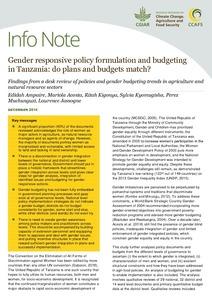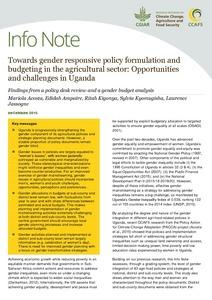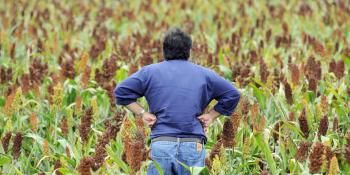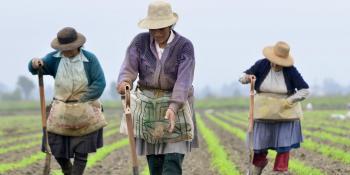Recent achievements and persistent challenges to gender-responsible policymaking in East Africa
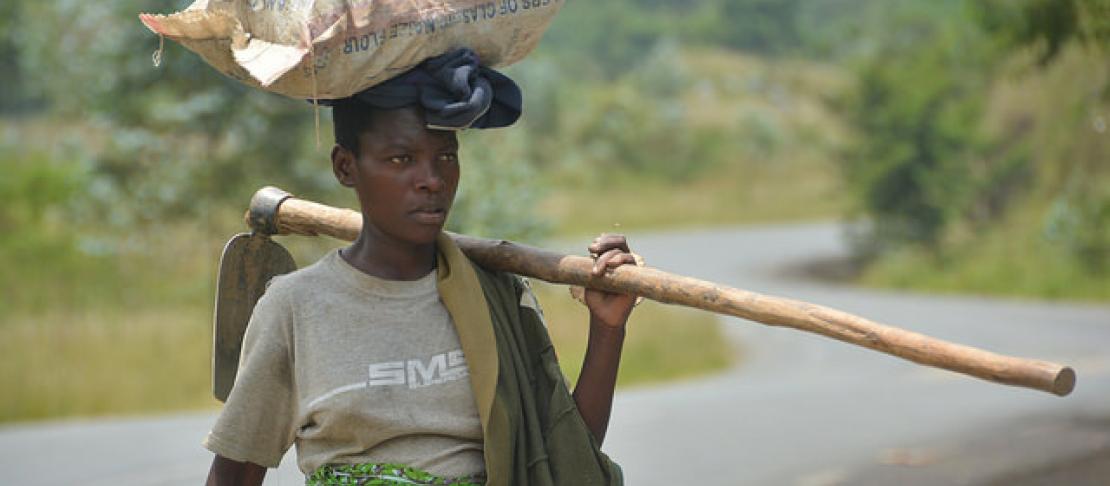
Two recent info notes present analyses of gender-related budgets and policies in Uganda and Tanzania
Gender-responsible policymaking in the domains of agriculture and climate change goes beyond the pursuit of social justice and achieving equality for all members of society, though this should be, on its own, already a significant motivation. Gender-responsible policymaking also provides clear economic and development benefits. In Uganda and Tanzania, for example, the cost of the gender gap in agricultural productivity has been estimated at around USD 67 and USD 105 million per year, respectively, corresponding to a share of 1.6 percent of agricultural GDP in Uganda (0.42 percent of total GDP) and 2.7 percent of agricultural GDP in Tanzania (0.86 percent of total GDP). This illustrates the extent to which gender inequalities in the agricultural sector in Uganda and Tanzania have important economic consequences for the development of these nations.
During the last decades, policymakers in East Africa have been increasingly acknowledging gender in agricultural policies and development projects. However, the extent to which these gender considerations are being implemented at the local level remains limited. The limited visible effects that gender mainstreaming strategies are having in the region can be partly explained by the way policies are being formulated and the type of gender activities being planned and budgeted for. With the aim of unpacking the degree of gender responsiveness in the region, the CGIAR Research Program on Climate Change, Agriculture and Food Security (CCAFS) gender researchers from the Policy Action for Climate Change Adaptation (PACCA) project analyzed over 150 agricultural and climate change policies, planning documents, and budgets in Uganda and Tanzania. Two info notes have just been published with the highlights of this research.
In Uganda, the majority of the documents reviewed presented some degree of gender integration, showcasing the country's efforts to progressively strengthen the gender component of its agri-food policies and strategic planning documents. However, almost a third of the documents still remain gender-blind. Within the policies, women are characterized as vulnerable and marginalized, with such victimizing stereotypes dominating the government documentation. The analysis also reveals that planning and implementation of gender activities is still weak at district and sub county level: budgets allocated for gender activities are small and principally spent on items that remain at the informative level (e.g. celebrating women’s day).
The info note published for Tanzania presents a similar situation, in which even though the country has made progress towards the advancement of gender issues in policies, there exists insufficient integration of gender issues at the lower levels of governance. Gender budgeting does not seem to be fully embedded in government programing yet, with very limited budgetary allocations and thus ineffective implementation of gender programs at district level.
However, while the integration of gender issues into policy documents and the allocation of sufficient budgetary resources are key aspects of gender-mainstreaming, these alone are not enough. It is equally important to examine the way in which policy-makers themselves understand gender and gender issues in a specific local context, and to understand how the gender mandates in policy will be translated, or not, in practice. Unpacking these will become key for an improved exercise in gender mainstreaming in future climate change adaptation and mitigation strategies.
Stay tuned for future updates on this research!
Further readings
- Info note: Towards gender responsive policy formulation and budgeting in the agricultural sector: Opportunities and challenges in Uganda
- Info note: Gender responsive policy formulation and budgeting in Tanzania: do plans and budgets match?
Related work on policymaking in East Africa from the PACCA team and colleagues:
- Blog: Scenario-guided policy planning makes headway in Tanzania
- Blog: Video gives a fresh look at scenario-guided policy planning in East Africa
- Blog: Climate proofing Uganda's agriculture sector
Mariola Acosta is a Research Fellow at the International Institute of Tropical Agriculture (IITA) in Uganda and PhD candidate at Wageningen University.

